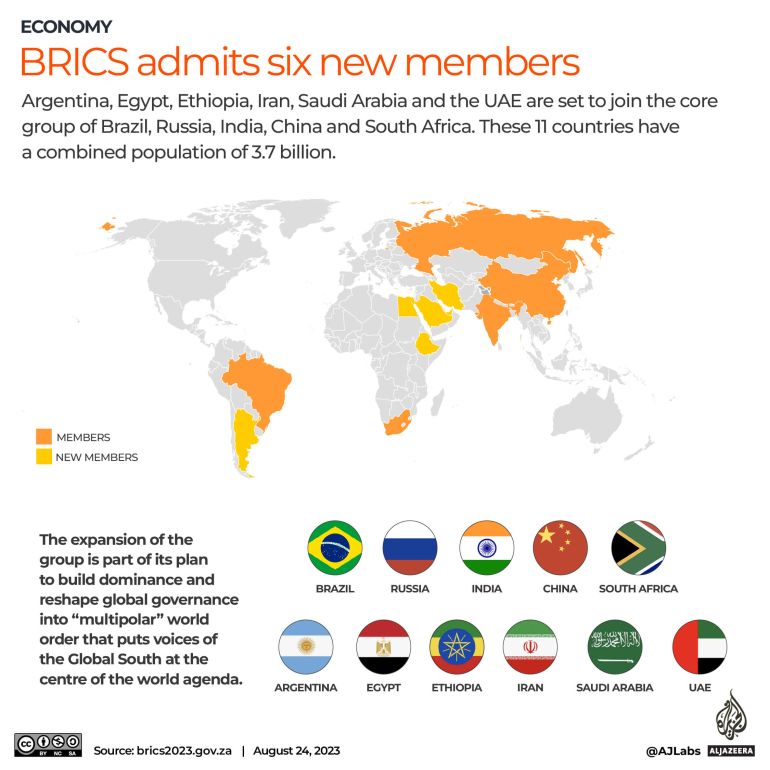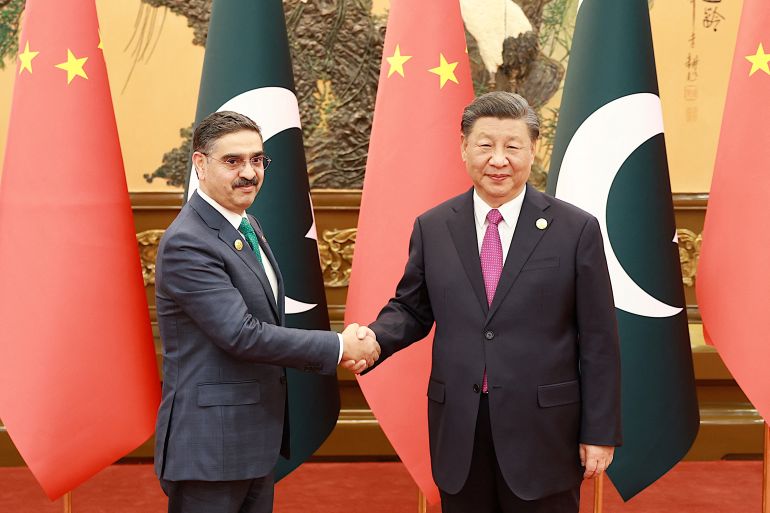The group, which this week criticized Israel for its Gaza war, is increasingly seen as a leading voice in the Global South.
Pakistan has
formally sought membership in the BRICS group of five emerging economies, which
includes rival India along with Brazil, Russia, China and South Africa, at a
time when the bloc is increasingly becoming a key bloc in the Global South.
Calling BRICS
"an important group of developing countries", Pakistan's foreign
ministry spokesperson, Mumtaz Zahra Baloch, revealed that the country had made
a "formal request" to join the group.
"We
believe that by joining BRICS, Pakistan can play an important role in advancing
international cooperation and revitalizing comprehensive multilateralism. We
also hope that BRICS will move forward with its commitment to comprehensive
multilateralism at the request of Pakistan." will grow,” Baloch said while
addressing a news briefing in Islamabad on Thursday.
The
spokesperson added that Pakistan has warm relations with "most" BRICS
members.
The
confirmation came two days after Pakistan's envoy-designate to Russia, Mohammad
Khalid Jamali, revealed in an interview with Russia's state-run TASS news
agency that the country had applied to join the group.
"Pakistan
would like to be a part of this important organization and we are reaching out
to member states in general and the Russian Federation in particular to support
Pakistan's membership," the ambassador told TASS.
Many analysts
believe that BRICS poses a challenge to the hegemony of the global system, specifically to the US and its Western allies in key policy decisions.
During the last
BRICS summit in South Africa in August, the group's popularity was evident with
at least 40 countries expressing interest in joining.
At the end of
the three-day summit, the group announced that six countries - Egypt, Ethiopia,
Argentina, Saudi Arabia, the United Arab Emirates and Iran - would join next
year.
 |
| Image Source: Al Jazeera |
Pakistan Senate
Foreign Affairs Committee Chairperson Mushahid Hussain Syed was in South Africa
earlier this year to attend the events on the sidelines of the leadership
summit. "The world is moving towards regionalism, and now countries are cooperating
to communicate with each other," Syed told Al Jazeera, praising the
government's move to join the body.
Salma Malik, an
associate professor and strategic affairs expert at Islamabad's Quaid-e-Azam
University, also agreed with Syed, saying such a "territorial, economic
and cultural union" would be beneficial for Pakistan.
"This is
the era of multilateralism. You are heard better in small blocs, and you can
express big concerns. You can build a common consensus on different issues of
concern," the academic was quoted by Al Jazeera. .
Earlier this
week BRICS countries - including the six that will join in 2024 - joined a
virtual meeting where they almost unanimously called for a ceasefire in
Israel's war on Gaza.
However,
foreign policy analyst Muhammad Faisal did not share his enthusiasm.
"Realistically,
other than repeating political statements such as that Pakistan is not
satisfied with the Western-led world order, it will not do much good," he was quoted by Al Jazeera.
Faisal added
that while Malik had requested to join the group, his membership was not
certain.
The road ahead
for Pakistan is very difficult and long. It involves a significant degree of
politics among founding members over the induction of new members. He added
that Pakistan's case is particularly fraught with Indian opposition, which may
depend on the health of India-China relations.
The concerns
are not unfounded. In June last year, Pakistan's foreign office said its
participation in a key policy dialogue event on the sidelines of the BRICS
summit in China was blocked by "a member".
Although
Pakistan did not name India as a country, it hoped that the bloc's future
involvement would be based on the principles of "inclusiveness" and
the interests of the developing world.
Syed said if
India plays a "spoiler" role on Pakistan's membership application, it
will increase such incidents.
"Be it
cricket, diplomacy or politics, India will always create hurdles. But they are
not the only game in town,” he said.
"The current Middle East crisis has shown that India is in the American or Israeli camp rather than being part of the larger global South. If you look at the bigger picture, India is on the wrong side of history.

Post a Comment
0Comments